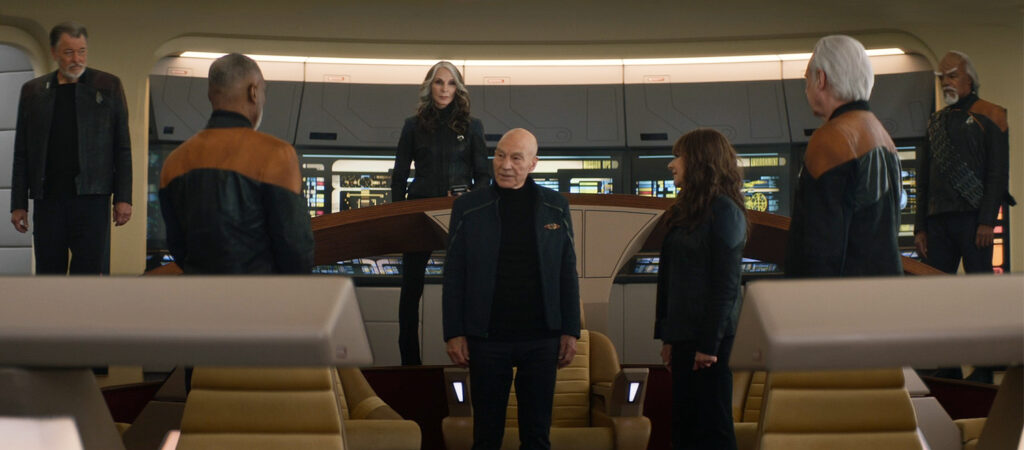Star Trek: Picard’s third season is one of the franchise’s finest achievements
Written by Ian Thomas Malone, Posted in Blog, Pop Culture, TV Reviews
Star Trek: Picard was built on the noble premise of exploring arguably the franchise’s most beloved figure against a backdrop that wasn’t just a reboot of The Next Generation. The execution of its first two seasons ran into some regrettable issues. A series that was simultaneously trying to establish a new cast, redeem the Romulan and Borg races, build on synth lore, and examine its titular figure’s complex relationships with franchise titans such as Q and Data, alongside tertiary TNG characters like Hugh the Borg and Bruce Maddox was always going to be a heavy lift. The first two seasons were often defined by sluggish pacing that didn’t see the urgency in all the complex storytelling the show ostensibly strove toward.
Many might point to the acclaim of season three as indicative of the show giving into nostalgia. The real triumph of Star Trek: Picard’s final season is its cohesive, determined storytelling. Retaining only Jean-Luc (Patrick Stewart), franchise stalwart Seven of Nine (Jeri Ryan), and Raffi (Michelle Hurd), the single original Picard character to retain a starring role across all three seasons, the show balanced out its roster with a compelling mix of fresh faces and legacy characters, including the entire core TNG cast. Three seasons in, Picard finally figured out how to balance its affection for the past alongside the franchise mandate to “boldly go where no man has gone before.”
For a season that riffed most of its core premise off storylines already thoroughly explored in Deep Space Nine with the changeling infiltration of Starfleet, as well as the not-so-original secret child trope in Jack Crusher (Ed Speleers) the real X-factor has been the USS Titan. Picard is the first new Trek series to take place in the timeline established by TNG, DS9, and Voyager since the opening sequence of the 2009 Star Trek reboot. The Titan actually feels like the Starfleet many of us grew up with, not the bleak deconstruction favored by prestige television.
Picard found itself an unlikely sleeper gem in Captain Liam Shaw (Todd Stashwick). The curmudgeonly foil to Picard and Riker (Jonathan Frakes) could have been an easy person to hate, but Stashwick quickly sold audiences on one unassailable truth. For as fun as it’s been for the audience to watch the crew of the Enterprise save the universe all these years, rank and file Starfleet has to be pretty sick of their nonstop drama. Shaw provided audiences with a sympathetic conduit unwittingly roped into their shenanigans.
The Titan serves as a place where the legacy characters can meaningfully interact with newer characters. The show took great care to establish figures like Sidney La Forge (Ashleigh Sharpe Chestnut) independent of her famous father (LeVar Burton), who everyone knew was bound to show up. Raffi and Worf (Michael Dorn) provided meaningful plot progression independent of the Titan, while Beverly Crusher (Gates McFadden) navigated the complexity of her place on their ship with ample grace, a triumph for fans who always wished for more for her character. Frakes delivered similar career-best work as Riker, the grief of a father channeled through his interactions with Picard and Troi (Marina Sirtis).
The success of season three’s story reflects the essential nature of its cast to the conflict. Unlike previous seasons, you actually get the sense that these people need to be a part of this particular adventure, a pivotal time in these figures’ lives. The show does a serviceable job looping in the previous two seasons, while also undoing plenty of their resolutions in less satisfactory manners, particularly with regard to Data (Brent Spiner) and certain antagonists vital to Picard’s entire arc. We the audience know that Picard exists because Paramount needs subscribers for its streaming service, but the show finally stopped feeling like it was reverse engineering ideas in search of a purpose.
The other big triumph of the season is the way the show managed to present satisfying episodic storytelling alongside its broader narrative. Early episodes such as “Seventeen Seconds” or “No Win Scenario” could have easily belonged to the 90s Trek canon while serving as pivotal setup for the rest of the season. The mandate for this season might have been to say goodbye to Picard, but the show also managed to lay out a compelling rubric for how future series, including a much-anticipated spinoff, might handle this beloved era of Trek lore.
It would be an oversimplification to lay the blame for Picard’s earlier failures on the show’s original, far less compelling cast that have almost all been sent packing. Season three sells the idea that the magic wouldn’t have been there if the show hadn’t tried other things first, even if they didn’t work very well. The TNG crew also aren’t all necessarily there to make up for the sins of Picard either, but earlier crimes in the form of the lackluster swan songs provided by Insurrection and Nemesis.
Season three is one of Star Trek’s crowning achievements, the gold standard for how franchises can blend in legacy characters while maintaining vitally present plotlines that don’t completely rely on nostalgia. There are so many obvious throwbacks here, the motherlode of which was dropped in the season’s penultimate episode. The passion burns brighter because we the audience have finally been given ample reasons to care.












I enjoy grammatically incorrect opinions from fans more than yawn-inducing critics.
I personally think season 3 has ruined the whole entire show if you have seen the first 2 seasons don’t watch the third due to a complete and utter muck up in continuation to make a story but for me it’s ruined the whole show but saying that if I had just watched season 3 on it own a great season but as show show all in all season 3 jus ruined the previous seasons unfortunately.